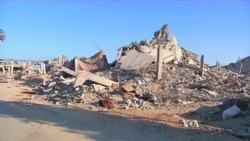U.S. Secretary of State John Kerry travels to Cairo Saturday for a donor conference on rebuilding parts of the Gaza Strip leveled during 50 days of fighting between Hamas and Israel.
Palestinian officials say it will take more than $7 billion to repair damage from fighting in Gaza that destroyed its only power plant along with more than 15,000 homes. But with little progress by Hamas and Israel following through on promises connected to the cease-fire, are donors willing to pay to rebuild what may again be knocked down?
State Department Spokeswoman Jen Psaki says Secretary Kerry keeps pushing for a return to talks on a two-state solution.
“Will there be opportunities to discuss that at this conference? Certainly, there could be, and I expect the Secretary will have some sidebar conversations, but it’s not the primary focus," said Psaki. "They’ll have to reconvene the parties to have that discussion separately from this conference.”
There is little momentum for getting back to that discussion as both sides have hardened positions since the cease-fire, with Palestinian President Mahmoud Abbas pushing for greater recognition at the United Nations.
"There is an occupation that must end now," he said. "There is a people that must be freed immediately. The hour of independence of the State of Palestine has arrived."
Israel says a Palestinian coalition government strengthens Hamas-supporter Iran at a time when Israeli Prime Minister Benjamin Netanyahu says many Arab leaders share Israeli security concerns.
“After decades of seeing Israel as their enemy, leading states in the Arab world increasingly recognize that, together, we and they face many of the same dangers," he said. "And principally this means a nuclear armed Iran and militant Islamist movements gaining ground in the Sunni world."
Building on its role in Syria, Iran has used the conflict in Gaza to strengthen ties with Hamas, says American University professor Akbar Ahmed.
"It sees the Gaza situation as an opportunity because the other Arab countries like Egypt, like Saudi Arabia, who would have traditionally supported the Palestinians, did not do so for all kinds of geopolitical reasons, which gave an opening to Iran," said Ahmed.
Hamas no longer has the backing of the government in Cairo, says U.S. Institute of Peace analyst Steve Heydemann.
"Hamas, as an offshoot of the Muslim Brotherhood, I think, remains under quite extraordinary pressure because of the extent to which it and its affiliated movements in Egypt and elsewhere have been increasingly repressed and marginalized, most of all in Egypt but not only in Egypt," he said.
Israel has agreed on procedures for the passage of supplies to the Gaza Strip, and U.S. officials say they hope Israel will contribute reconstruction materials as well. Calling on “all governments who can play a role,” the Obama administration has stopped short of linking that aid to progress on a sustainable cease-fire.





